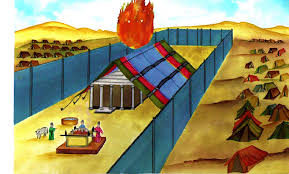Joshua 21:1-2 – Then the heads of the fathers' houses of the Levites came to Eleazar the priest and to Joshua son of Nun and to the heads of the fathers' houses of the tribes of the people of Israel. And they said to them at Shiloh in the land of Canaan, "The Lord commanded through Moses that we be given cities to dwell in, along with their pasturelands for our livestock."

Finally, we come to the portion of scripture dealing with the inheritance of the tribe of Levi.
After all the other tribes had received an allotment, the Levites came to Joshua, Eleazar and the elders of the nation to request their own inheritance. This may seem somewhat familiar, because earlier we noted that Caleb did the same thing – he came to the leadership of the nation to request that which had been promised to him.
In both cases (Caleb and the tribe of Levi), God had promised them a gift/inheritance, but that inheritance didn't just jump into their hands – they had to pursue it.
What was involved in the pursuit?
First, there was an assurance that the promise belonged to them. The Levites had heard the Lord promise to give them 48 cities in the Promised Land, and they didn't forget it (Numbers 35:7). Day-in and day-out, during all those years of wandering in the desert, they kept that promise in their hearts and passed it down to their children. They both valued and desired the gift God set aside for them.
Second, they had the faith to believe that God keeps his promises – without exception. If he promised them 48 cities, the Levites firmly believed they would be given that exact amount.
Furthermore, they understood that God only gives gifts that are good. Therefore, they knew these 48 cities would not be run-down, demolished slums. They would be vital, fully functional living spaces which would be a blessing to their families.
Third, they finally arrived at a point where they knew/sensed they needed their gift immediately. In order to move ahead and fulfill the duties God had given to them in the nation (studying the scripture, teaching, running the tabernacle, etc), they had to have their gift – they had to be able to settle their families in permanent homes and provide for their livestock. It was time to finally unpack their bags and settle down for good.
How did the Levites claim their gift/inheritance? They simply came to the highest authority in the kingdom and asked to have possession of that which (technically speaking) already belonged to them. It was that simple.

We know this to be true, because the remainder of this chapter outlines the inheritance they received. It is very clear that the Levites did not have to beg/plead for what they needed, nor were they required to strike any bargains or jump through any hoops. They simply received what they asked for.
This reflects a spiritual truth. Just as God promised a gift/inheritance to the Levites, so he has promised spiritual gifts to Christians. Yet, these things won't automatically drop into our hands. Three things are required for us to obtain them – the same three things required of the Levites.
First, we must know/be assured that God has promised us gifts, just as he did the Levites. These gifts already belong to us; we don't need to beg and plead for him to give them to us. God has already provided all we need through the death and resurrection of Christ:
Ephesians 1:3 – Blessed be the God and Father of our Lord Jesus Christ, who has blessed us in Christ with every spiritual blessing in the heavenly places.
The apostle Peter also tells us this:
II Peter 1:3-4 – His divine power has granted to us all things that pertain to life and godliness, through the knowledge of him who called us to his own glory and excellence, by which he has granted to us his precious and very great promises.
Notice that both of these passages of scripture are in the past tense. In other words, God has ALREADY provided these spiritual gifts to us. In fact, he has granted us EVERY SPIRITUAL BLESSING as well as ALL THINGS that we need for this life.
In order to claim these gifts/promises Christians MUST have the faith to believe that God keeps his promises. Do you believe God is faithful to his word? Do you also believe that every gift God gives to you is good and/or perfect (James 1:17)?
If so, then let me ask you this: do you recognize a need in your life? Have you arrived at the point where you know or sense that you need a gift from God right now?
As we spiritually take land for the kingdom of heaven, we will experience the need for new and/or greater spiritual and temporal gifts. As we continue the work God has given us, we will develop a sense of urgency about obtaining these gifts because our need will be increasingly evident.

Do you feel a need for words of wisdom or the ability to discern spirits? Do you have a need for a personal, heavenly prayer language? Do you have a need for a ministry partner, further education or increased resources? Perhaps a new church or office building? What needs do you sense in your own spiritual walk/ministry/church right now?
Once you know what has been promised, you have the faith to believe God will give it to you and you sense the time is right, move ahead - approach Father God through his Son Jesus and ask for what you have been promised!
Let me just reiterate once again (because we sometimes struggle with this concept), God has already promised to give us all things that pertain to life and godliness. You do not need to beg, plead or make deals with God in order to receive these blessings; they are already ours through Christ Jesus. Once we recognize our need, all we have to do is ask for what is already ours:
Matthew 7:7-8 – Ask, and it will be given to you; seek, and you will find; knock, and it will be opened to you. For everyone who asks receives, and the one who seeks finds, and to the one who knocks it will be opened.
Once you have asked for what you need, simply receive it the same way you received your salvation – by faith in God. Just ask and receive in faith!
Joshua 21:3 – So by command of the Lord the people of Israel gave to the Levites the following cities and pasturelands out of their inheritance.
When we examine the scriptures, it turns out that God was very specific about the 'borders' of the Levites, just as he was specific about the borders of the other allotments. The Levites were to receive not only the city but the suburbs or pasture lands surrounding it.
The borders of the Levite cities were determined by measuring a distance of two thousand cubits (3000 feet or 1000 yards) outward from the outside edge of the city wall in all four directions (north, south, east and west). The resulting line was the border of the territory of the Levites:
Numbers 35:5 – And you shall measure, outside the city, on the east side two thousand cubits, and on the south side two thousand cubits, and on the west side two thousand cubits, and on the north side two thousand cubits, the city being in the middle. This shall belong to them as pastureland for their cities.
It is interesting to note that God specified that the city was to be in the center of the allotment. This meant that the tribes who gave the cities couldn't 'fudge' the borders by giving the Levites more land in one direction in order to save a choice piece of land for themselves.

This may have been plenty of land for tending sheep and goats but what about crops? Were the Levites given any farmland?
The answer is no. God didn't want the Levites spending all their time growing food. He wanted them to spend their time attending to his temple, studying his law, and teaching his people. For this reason, he gave the Levites the grain and first fruit offerings that were brought into the tabernacle. In other words, the tithes and offerings of the people provided the needs of the clergy, allowing them the time they needed to minister to the nation.
This still occurs in most churches today. Christians should be attending a local church, and they should be paying tithes and giving offerings to that church. As they do, all the needs of the church are provided for – the salary of the pastor/leaders, as well as the utility bills and other outreach ministries.
Now, let's switch gears for a minute. Before we move on to look at the specific details of the inheritance of Levi, let's do a very brief review of their family lines.
Levi had three sons – Gershon, Kohath and Merari (I Chronicles 6:1). These became the three branches of the Levites.
Kohath's firstborn son was Amram, and he had three children whose names you will recognize: Aaron, Moses and Miriam.
Talk about a talented family! Moses spoke to God face to face (Exodus 33:11) and led the children of Israel out of Egypt. Miriam led Israel in worship and God appointed Aaron as the first high priest in the nation. The position of high priest was then passed down from father to son. All other males in Aaron's family line became 'ordinary' priests in the temple.
Accordingly, we would assume that Aaron's oldest son Nadab would become the next high priest. Unfortunately, Nadab and his brother Abihu were killed by the Lord for rebelling against his commands (Leviticus 10:1-2). This meant that the next high priest after Aaron should be his son Eleazar. And sure enough, Eleazar is the priest who assisted Joshua in the casting of the lots for each tribe's inheritance.
It was a blessing and a privilege to be a member of the priestly family. It was also a lot of work! In fact, the Lord knew that the service of the temple would be way too much work for a single family line to manage. So, while Israel was camped out at Mount Sinai, the Lord instructed Moses to dedicate the entire tribe of Levi to helping the priesthood (Aaron and his sons) with these responsibilities (Numbers 3:9).
Thus, we find that during the wilderness wandering, each of the family lines – Gershon, Kohath and Merari – were assigned specific duties/tasks associated with the temple.
That might not sound like much work until you consider that the tabernacle was a large and somewhat complex structure, which was taken down, carried through the wilderness and then reassembled every time Israel stopped to camp. We can't fully discuss the details here, but I want to mention the basics, so you get an understanding of what was involved in moving this structure from place to place.
The tabernacle had silver bases which held up vertical support beams. There were also horizontal beams for stabilizing the structure. The tabernacle area was subdivided into the outer court, the holy place and the most holy place, which were all separated by beams and curtains.
There were also three layers of 'coverings' which were draped over the framework of the Holy Place and Most Holy Place to create the tent.

The first layer consisted of 10 curtains of fine twined linen interwoven of blue and purple with figures of cherubim. The 10 curtains were jointed together in sets of 5 to form two large curtains, which were fastened together with loops and gold rings to form the first layer of covering on the temple framework (Exodus 26:1-6).
The second layer (sometimes called the tent covering), was made with 11 curtains of goat hair. One set of 5 was sown together, while the second set of 6 was also sown together. These two curtains of goat hair were also joined together with loops and clasps (this time of bronze), and the entire curtain was placed on top of the linen curtain (Exodus 26:7-13).
Finally, a covering of seal/porpoise or badger skins was placed on the top as a waterproof cover.
Don't forget there were also several pieces of furniture in the temple. There was the brazen (bronze) altar, the laver, the candlestick, the table of showbread, the altar of incense and the Ark of the Covenant. All these pieces of furniture (other than the ark) also had numerous utensils associated with them such as forks, shovels, plates, bowls, knives, pans, etc. Temple services also required wood, oil, water, incense, etc.
During the wilderness wandering, the Kohathites were responsible for moving and guarding the furniture of the temple (after it was prepared by the priests). The Gershonites were responsible for all the curtains and screens and the Merarites were responsible for all of the bases, frames, bars, pillars and anything else associated with the framework of the structure.
The care/maintenance of the tabernacle and its priestly duties were clearly a full-time job which required an entire tribe just to keep up with it!
Joshua 21:4-5 – The lot came out for the clans of the Kohathites. So those Levites who were descendants of Aaron the priest received by lot from the tribes of Judah, Simeon, and Benjamin, thirteen cities. And the rest of the Kohathites received by lot from the clans of the tribe of Ephraim, from the tribe of Dan and the half-tribe of Manasseh, ten cities.
The inheritance of the Levites was determined in the same place (Shiloh) and in the same manner (by lot) as the other tribes had received their inheritance. Most scholars believe that each tribe had already designated certain cities for the Levites when they received their initial allotments of land. This makes sense, because they wouldn't have wanted to move their families into some of these cities only to have to move them again when the city was given to the Levites.
The first lot that was drawn went to the Kohathites. Remember, the priestly families of Aaron and his descendants came from the family branch of Kohath.
Scripture tells us that the descendants of Aaron (the actual priesthood) received a total of 13 cities, while the remainder of the Kohathite families received an additional 10 cities for their inheritance (see verse 26). This made the total allotment of the Kohathites 23 cities.
Joshua 21:6 – The Gershonites received by lot from the clans of the tribe of Issachar, from the tribe of Asher, from the tribe of Naphtali, and from the half-tribe of Manasseh in Bashan, thirteen cities.
The second lot was drawn for the Gershonites. They received a total of 13 cities.
Joshua 21:7 – The Merarites according to their clans received from the tribe of Reuben,the tribe of Gad, and the tribe of Zebulun, twelve cities.
The Merarites were the last to receive an allotment. The received a total of 12 cities.
Altogether, 48 cities (including the cities of refuge) were allotted to the Levites, just as God had promised them.
Joshua 21:8 – These cities and their pasture lands the people of Israel gave by lot to the Levites, as the Lord had commanded through Moses.
As the 48 cities are divided among the Levites, we are again put in remembrance of the prophetic words that Jacob spoke over his son Levi (and Simeon) – 'I will divide them in Jacob and scatter them in Israel' (Genesis 49:7).

What a blessing this prophesy turned out to be for the nation of Israel! By disbursing them throughout the land, every family in Israel could have reasonable access to the men who were best acquainted with the law. They could receive instruction, have questions answered and see an example of the holy lives they were to aspire to live (Malachi 2:7).
We can compare the role of the Levites in their society to the role of Christians in ours. Christians are scattered among the heathen. There are definitely some sinners who will never even consider entering a church to receive the gospel, so the Lord has seen fit to place us among them so we can carry the gospel to them. We provide a testimony for Christ by living holy, compassionate lives in our communities.
Christians are not to live apart from the world to ensure our own sanctification; we are to live in the world to promote the world's redemption.� We are to be shining examples of the love of God to all men.
Joshua 21:9-26 – The following cities mentioned by name, which went to the descendants of Aaron, one of the clans of the Kohathites who belonged to the people of Levi; since the lot fell to them first. They gave them Kiriath-arba, Hebron, the city of refuge for the manslayer, with its pasturelands, Shechem, the city of refuge for the manslayer, with its pasturelands. The cities of the clans of the rest of the Kohathites were ten in all with their pasturelands.
Verse 9-26 give a detailed list of the cities assigned to the priestly line and to the rest of the Kohathites. Since we are not examining the significance of each individual city, I have abbreviated the list in today's post. If you have an interest in seeing the names of all 23 cities, please look in your bible.
Joshua 21:27-33 – And to the Gershonites, one of the clans of the Levites, were given Golan in Bashan with its pasturelands, the city of refuge for the manslayer, Kedesh in Galilee with its pasturelands, the city of refuge for the manslayer, Hammoth-dor with its pasturelands. The cities of the several clans of the Gershonites were in all thirteen cities with their pasturelands.
Joshua 21:34-40 – And to the rest of the Levites, the Merarite clans, were given Ramoth in Gilead with its pasturelands, the city of refuge for the manslayer, Mahanaim with its pasturelands. As for the cities of the several Merarite clans, that is, the remainder of the clans of the Levites, those allotted to them were in all twelve cities.
Verses 27-33 give a detailed list of the cities assigned to the line of Gershon while verses 34-40 list the cities assigned to the line of Merari. Again, I have abbreviated the list in this post; in order to see the entire list you will need to consult your copy of the scriptures.

By the way, you might really enjoy taking a closer look at these lists of cities. Many of them became key places later in Old Testament history. How many names of cities do you recognize? Can you remember what occurred there? If not, it might be fun to find out!
Joshua 21:41-42 – The cities of the Levites in the midst of the possession of the people of Israel were in all forty-eight cities with their pasturelands. These cities each had its pasturelands around it. So it was with all these cities.
Again, we want to note that the priests and Levites were scattered throughout the Promised Land for the benefit of the nation. As the people most familiar with the law, they were there to council, teach and instruct the people, while modeling a life of holiness in their conduct.
God had amply provided them with numerous choice cities, so they could be wholly dedicated to the service of the Lord and not be distracted by claiming and working the land. For this reason, it would be utterly inexcusable for them to neglect their ministry.
Joshua 21:43 – Thus the Lord gave to Israel all the land that he swore to give to their fathers. And they took possession of it, and they settled there.
At first, there seems to be an inconsistency with this verse and the fact that Israel had not yet fully possessed the land and defeated all the Canaanites. However, it should be noted that God had completely fulfilled his part of the covenant.
In God's eyes, the Canaanites had already been delivered into the hands of his people. They were discouraged, fearful, broken in strength, void of major military leaders and holding only spotty positions throughout the territory. Essentially, they were surrounded by God's people and they could have easily been defeated.

All Israel needed to do was seek divine guidance on how to claim the victory, then step out in faith and get the job done. But alas! They never fully possessed all the land God had given them (Numbers 34:1-12).
However, it should never be said that God failed to keep his promises - it was man who failed to reach out and grasp the victories God had given!
Likewise, the New Testament speaks of the triumph of each individual Christian and the victory of the church as already being accomplished in God's eyes. While God has made victory possible through Jesus Christ, and it is his will that we be victorious, we still must fight to subdue/conquer our enemies and claim/live out the victory his grace assures us.
Fun Fact: While studying this topic, I ran across a bible commentator who described the Israelites as being 'pusillanimous.' I don't know about you, but this word isn't in my daily vocabulary, so I looked it up.

Turns out it means, 'timid; exhibiting a contemptible lack of courage or determination'. Apparently, the emphasis is on the word 'contemptible', meaning that there was absolutely no reason why Israel should have feared to take the land. Their refusal to do so was base and deserving of scorn.
Let us strive to live boldly for Christ, so the church can never be referred to in this manner!
Joshua 21:44 – And the Lord gave them rest on every side just as he had sworn to their fathers. Not one of all their enemies had withstood them, for the Lord had given all their enemies into their hands.
This is a general closing statement to the history of Israel's conquest of the Promised Land which began in chapter 13.
God had given Israel the deed to the entire parcel of the Promised Land (a deed, incidentally, which they still hold today), actual possession of much of it, and the power to possess the rest of it as soon as their numbers increased, and they had need of it (Exodus 23:29-30). God had also given them absolute dominion over all the remaining Canaanites.
At this point in time, the Promised Land was now considered conquered – it was divided by lot among the tribes and the Canaanites were so completely routed that there was not a single army willing to attack Israel. Those left in the land were either paying tribute or quietly trying to avoid the gaze of the Israelites.
The bottom line is that GOD IS FAITHFUL TO HIS WORD. This is a promise that ancient Israel stood upon and which the church stands upon too.

Nevertheless, we need to remind ourselves of several key aspects of God's faithfulness.
God fulfills his promises on his own time schedule. Much to our annoyance, God does not always do things instantaneously or immediately. Often, he does not fulfill his promises when we expect him to. Because of this we can sometimes be tempted to become discouraged or to doubt his word.
During those times of waiting, satan will often attack by accusing God of breaking his promises. When that happens, resist him so he must flee! Reassure yourself that God is perfect; he will fulfill his promises in the 'fullness of time' or at the exact right moment! Many times we cannot see his perfect timing until after the situation is over, but when it is, his wisdom becomes apparent.
God fulfills his promises in the way/manner of his own choosing. We may be tempted to grumble about how he answers our prayers, because we would like things done differently. But in these instances, we must remember that God's ways are not our ways – his ways are much, much better than ours (Isaiah 55:8-9)! While we are usually looking for the easy way out, God's ways usually help us to stretch our faith, grow closer to him, build a testimony, and otherwise mature in grace.
For example, let's suppose you were diagnosed with cancer. As a Christian, you certainly prayed (in faith, no doubt) for God to instantly heal you. When that didn't happen, and you had to move forward with treatment, you may have been tempted to grumble. But later, you may find that God chose to cure you through modern medicine because it drew you closer to him, created a testimony and matured your faith.
So no matter what the circumstance, know that God hears your prayers and that he WILL be faithful to his word – but in his own perfect way!
God's promises are often connected to our faith and conduct. His covenant is iron-clad as long as we keep our side of the agreement. For instance, God promised Israel that he would remove the Canaanites from the land, but since Israel refused to step up and do as God directed, their enemies remained.
If you are looking for God to fulfill a promise for you, make sure you have done your part.
Joshua 21:45 – Not one word of all the good promises that the Lord had made to the house of Israel had failed; all came to pass.
Hallelujah and amen! God's promises to Israel never failed and they won't let us down either! As individuals and as the church, we can be assured that though heaven and earth may pass away, the word of God shall stand forever (Isaiah 40:8)!
Let me offer you some encouragement and relief:
God's word never returns to him void (Isaiah 55), because it is endued with his power and anointing:
John 1:1 – In the beginning was the Word, and the Word was with God and the Word was God.
For example, God spoke light/darkness, sea/dry land, plants/vegetation etc into existence from nothing, with the power of his words (Genesis 1).
You can rest assured that every single word of prophesy in our world either has been fulfilled, or it will be because God's promises are not hollow empty words – they are full of power; they bring life to our situation by manifesting God's will into our lives.
For this reason, I strongly encourage you to speak the word of God over your situation when you pray. For instance, if you are struggling with fear or anxiety, verbally quote II Timothy 1:7 every time you feel anxious. These words are God's words, so they carry an anointing to break the bondage of fear and anxiety. They can help you attain a calm and sound mind. By quoting them, you are resisting the will of the devil and he will be forced to flee from you!
Let me offer you some strength:
Have you ever gone through a spiritual or physical battle that left you weary, drained and tired?
I'm sure the children of Israel felt that way for quite some time. However, God had promised them a period of rest, and by the time the Levitical cities were assigned, they had entered it.
They rested from the fatigue of marching for years on end, from the wars in Canaan and from the insults which their enemies had heaped upon them.
Scripture tells us that God has also set aside a day of rest for the New Testament saints.
Hebrews 4:9-10 – So then, there remains a Sabbath rest for the people of God, for whoever has entered God's rest has also rested from his works as God did from his.
God has a day of rest set aside for the church just as he did for the nation of Israel. When the time is right, we will enter heaven with Christ and lay aside the endless toil of this sinful life, our war against the devil and the insults of the heathen.
